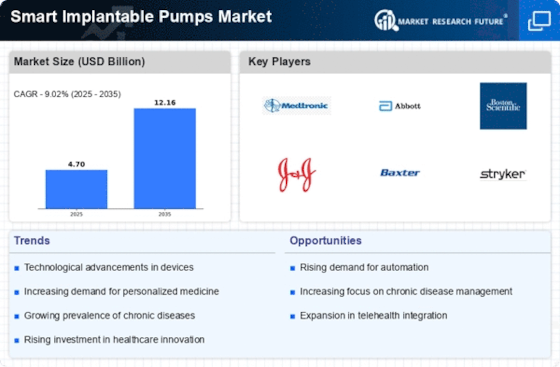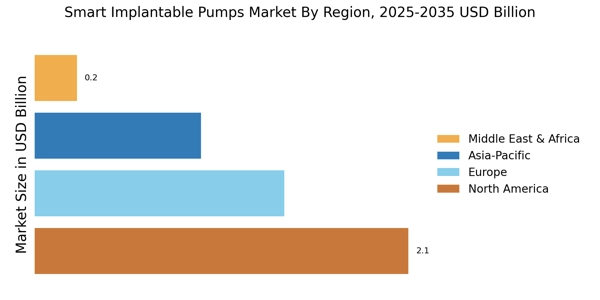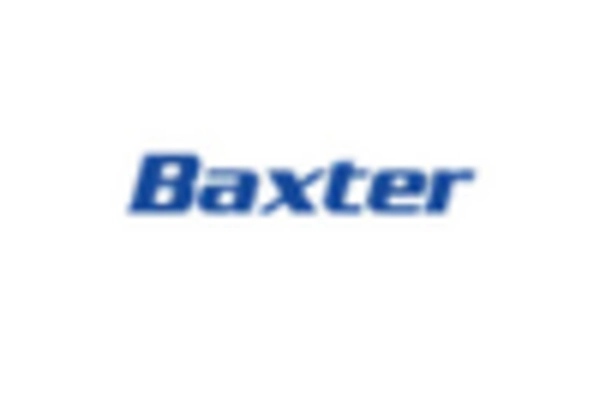Rising Prevalence of Chronic Diseases
The Smart Implantable Pumps Market is significantly influenced by the rising prevalence of chronic diseases such as diabetes, heart failure, and chronic pain conditions. As the global population ages, the demand for effective management solutions for these conditions is increasing. According to recent statistics, the number of individuals diagnosed with diabetes is expected to reach 700 million by 2045, creating a substantial market for insulin pumps and other implantable devices. This trend indicates a growing need for smart implantable pumps that can provide continuous and automated drug delivery, thereby improving patient adherence and quality of life. The increasing burden of chronic diseases is likely to drive investments in research and development, further propelling the market forward.
Increased Investment in Healthcare Technology
The Smart Implantable Pumps Market is witnessing increased investment in healthcare technology, which is crucial for the development and adoption of innovative medical devices. Governments and private sectors are allocating substantial funds to enhance healthcare infrastructure and promote research in medical technologies. This influx of capital is expected to accelerate the development of smart implantable pumps, making them more accessible to patients. Furthermore, partnerships between technology companies and healthcare providers are likely to foster innovation, leading to the creation of next-generation devices that offer improved functionalities. As a result, the market is poised for robust growth, driven by these investments that aim to enhance patient care and treatment outcomes.
Growing Focus on Minimally Invasive Procedures
The Smart Implantable Pumps Market is benefiting from a growing focus on minimally invasive procedures in healthcare. Patients and healthcare providers are increasingly favoring techniques that reduce recovery time and minimize surgical risks. Smart implantable pumps, which can be inserted with minimal incisions, align well with this trend. The market for these devices is expected to expand as more healthcare facilities adopt minimally invasive surgical techniques. Additionally, the development of advanced imaging technologies and robotic-assisted surgeries is likely to enhance the precision of implantable pump placements, further driving market growth. This shift towards less invasive options is indicative of a broader movement in healthcare towards patient safety and comfort.
Technological Innovations in Smart Implantable Pumps
The Smart Implantable Pumps Market is experiencing a surge in technological innovations that enhance the functionality and efficiency of these devices. Recent advancements in microelectronics and materials science have led to the development of pumps that are smaller, more reliable, and capable of delivering precise dosages. For instance, the integration of wireless communication technologies allows for real-time monitoring and adjustments, which can significantly improve patient outcomes. The market is projected to grow at a compound annual growth rate of approximately 10% over the next five years, driven by these innovations. Furthermore, the introduction of smart algorithms for dosage calculations and patient-specific adjustments is likely to revolutionize treatment protocols, making them more effective and tailored to individual needs.
Rising Awareness and Acceptance of Smart Medical Devices
The Smart Implantable Pumps Market is experiencing a rise in awareness and acceptance of smart medical devices among patients and healthcare professionals. Educational initiatives and marketing campaigns are effectively informing stakeholders about the benefits of these advanced devices, such as improved medication adherence and enhanced quality of life. As patients become more informed about their treatment options, the demand for smart implantable pumps is likely to increase. Additionally, healthcare providers are recognizing the potential of these devices to streamline treatment protocols and improve patient outcomes. This growing acceptance is expected to drive market growth, as more individuals seek out innovative solutions for managing their health conditions.

















